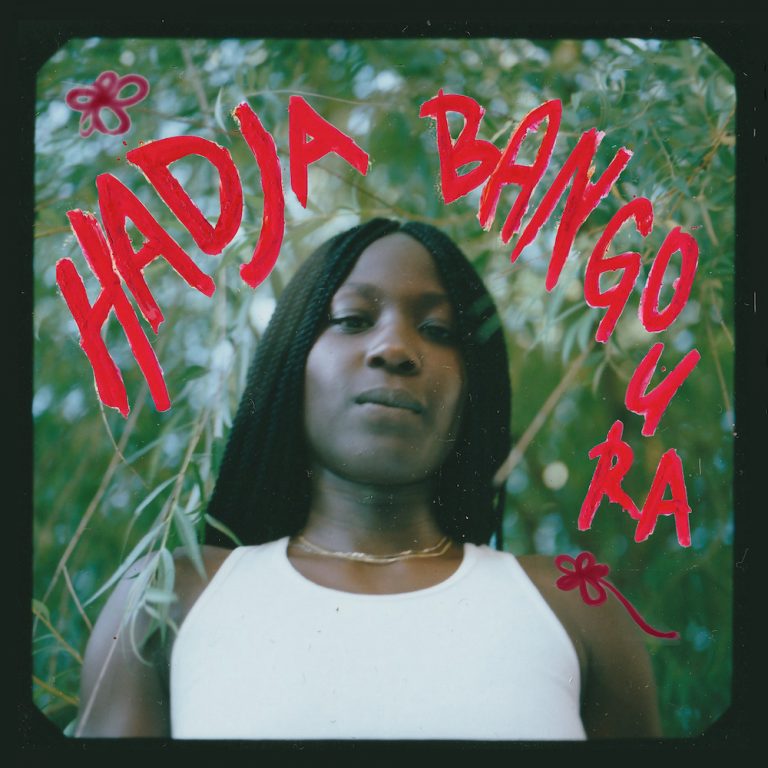Hawa abandoned her prodigal ascent in orchestral music at age 15. In 2018 and still just age 17, she explained to Complex it was because the orchestra’s collaborative nature was too political and, ultimately, writing it was boring. She was promoting the release of her debut pop single, “Might Be”, and insisted on being known as “a creator” as opposed to a musician or artist. Others in her generation make “bullshit” music, whereas she is a leader and a rebel. “It’s go big or go home”, she said.
Finally unveiling her album debut, Hadja Bangoura, she certainly hasn’t gone big: the 11 tracks span just 18 minutes. However, that shouldn’t be taken to mean she has shrunk back or is struggling to produce – even if her evolution since “Might Be” demanded that Hawa go home.
On her first few singles, Hawa’s vocals originate in a husky, lower register and sound almost like a woman imitating a man – a clumsy metaphor for her lesbian conquests. “Might Be” has a textbook trap beat, busy melody, and standardized structure that might not be bullshit, but it’s not burn-your-bridge-to-the-New-York-Philharmonic promising, either.
She has been producer-monogamous with Tony Seltzer (her “creative director”) and the pair gradually increased their trust in her singing voice while looking to West Africa (Hawa was born in Berlin but raised in Conakry, Guinea) for rhythmic and tonal inspiration. After four years releasing only singles, their work has climaxed in 11 songs that nearly function as a single one. So, it turns out, “Might Be” foreshadowed Hadja Bangoura about as much as “Precious, Precious” did Hot Buttered Soul.
Hadja Bangoura is named for her late grandmother, whose passing led Hawa into reflection and to upend her toxic relationships. And so, she confronts her lover(s) with a brutal directness that is offset by the density of the musical score: what comes out of her mouth is merely a blunt distillation of what’s swimming in her head.
The primary foil is a woman whose bisexuality torments Hawa while keeping her on a string. The album unfolds with Hawa adoring this still-sleeping beauty in pride-comes-before-the-fall fashion: boasting about the great sex and mocking an unknowing boyfriend. It’s not long before Hawa is rocked by the one-way nature of a relationship with a person who goes both ways. Yet the narrator contributes to the predicament without directly acknowledging as much: as her confusion becomes more frayed, so escalates her neediness and clinginess, while she manifestly mistakes sex for love.
The production brings the intensity of Hawa’s infatuation into focus. Backing vocals – operating like a Greek chorus – are layered to the point of indistinction, floating freely in the mix of “Trade” while synth chords and bass ghost in the background; at three minutes in length, it’s the album’s epic. The tone turns on “Gemini”, a throbbing panic that reveals the masochistic slant on her side of the affair, linking sonically and emotionally to early The Weeknd.
The remainder of Hadja Bangoura see-saws psychologically and fractures rhythmically. The explicit “MMMM” is time-signature soup, emblematic of the whole stop/start détente, while “Credits” returns to the Weeknd motif: staggeringly drunk and weepy. The only misstep is “Progression”, a tear-eyed soliloquy with a vapid “I’m famous / you should be jealous” riposte.
Hawa takes an estimable risk by offering a brief vignette as a proper debut, but the gamble pays off. She insisted she’s a rebel and a leader, so her economy stands in contrast to digital-age artists who still abide analog traditions. Depth is not always proportional to length in music, and it dominates the ratio here.

